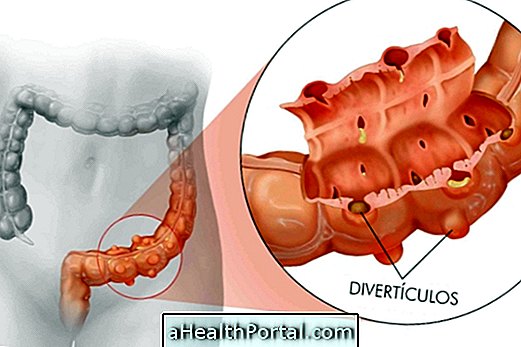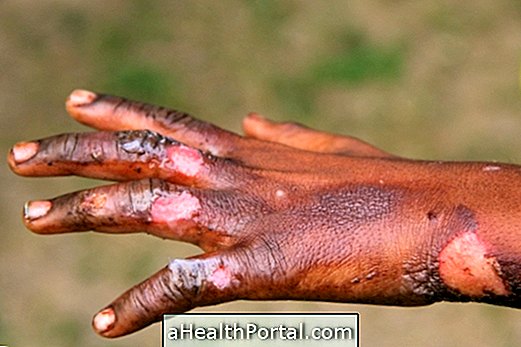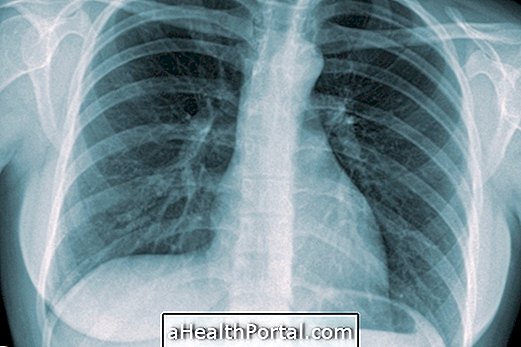Hepatitis is inflammation of the liver, which is usually caused by viruses or drug use. Symptoms of hepatitis usually come a few days after contact with the virus and are manifested through the yellowish color on the skin and the whites of the eyes and their treatment depends on what caused the disease.
There are several types of hepatitis, but the most common ones in Brazil are hepatitis A, B, and C, which can usually be cured with the right medicine.

Main symptoms
Symptoms of hepatitis may vary slightly depending on the type of virus involved but usually manifest in the acute phase of hepatitis through:
- Headache and general malaise;
- Pain and abdominal swelling;
- Yellowing of the skin and whites of the eyes;
- Dark urine, with coca-cola color;
- Clear stools, such as putty;
- Nausea, vomiting, and weight loss for no apparent reason.
Hepatitis B usually has no symptoms and progresses slowly. In the few cases that present symptoms, these may be fever, yellowing of the skin and eyes, and malaise, and 95% of the time healing of hepatitis B can be achieved, although there are cases of chronic hepatitis B.
The diagnosis of hepatitis can be made by observing the patient and by confirming the diagnosis through a blood test that evaluates the presence of the hepatitis virus in the body (anti-HAV, HBV and HCV). Eventually hepatitis can also be discovered through abdominal ultrasonography.
Check out a more complete list of symptoms of hepatitis A, hepatitis B, or hepatitis C.
Possible causes
The causes of hepatitis may involve contamination with viruses, bacteria or parasites, and in Brazil the hepatitis A, B and C viruses are the major culprits for cases of hepatitis in the country. In this way, the causes of inflammation in the liver can be:
- Infection with hepatitis A virus, B, C, D, E, G; bacteria or parasites that cause hepatitis;
- Uncontrolled use of some medications;
- Excessive consumption of alcoholic beverages;
- Ingestion of poisonous mushrooms.
Hepatitis can also occur due to some diseases such as Lupus, Sjögren's Syndrome, cystic fibrosis, inflammatory bowel disease, hemolytic anemia, rheumatoid arthritis, scleroderma or glomerulonephritis.
How is hepatitis transmitted?
Transmission of hepatitis may occur through oral-fecal contact or contact with contaminated blood. Some common forms of contamination include:
- Share syringes;
- Having relationships without a condom;
- Consume food or water contaminated by faeces;
- Contact with urine or feces of an infected person.
Other less common forms of contamination are blood transfusion before 1990, and mother-to-child through normal delivery, when the correct prenatal care has not been performed.

Prevention of hepatitis
In relation to the prevention of hepatitis it is recommended to take the vaccines against hepatitis A and hepatitis B, to use condoms in all the sexual relations, not to share syringes and to adopt measures of hygiene like always to wash the hands after to go to the bathroom and before eating. Also it is important to be cautious when performing piercings or tattoos requiring new or properly sterilized materials.
Check out the main ways of transmitting each type of hepatitis and how to prevent it in each case.
How is hepatitis treated?
Treatment for hepatitis can be done only with rest, good nutrition and hydration. However, in some cases the doctor may prescribe the use of medicines such as Interferon, lamivudine, adefovir, dipivoxil and entecavir. Here are some tea options that can complement the treatment.
Hepatitis medicines can cause side effects such as irritability, headache, insomnia and fever, and therefore many patients drop out of treatment without the doctor's knowledge, compromising the cure of hepatitis. Although these are unpleasant symptoms are more frequent at the beginning of treatment and tend to decrease with the use of analgesics, antidepressants or anti-inflammatories.
The treatment time may vary from 6 to 11 months, depending on the type of hepatitis and the patient's immune response. Throughout the treatment one must be careful to prefer foods of easy digestion, being recommended to follow a diet to treat hepatitis or watch this video of our nutritionist:

Hepatitis has a cure
Hepatitis usually has a cure, but in some cases, when the individual is not properly treated or does not follow the doctor's advice, the disease can cause complications and be more difficult to heal and can lead to death.
More serious cases may require hospitalization for the control of the disease because chronic hepatitis increases the risk of developing cirrhosis and cirrhosis increases the risk of liver cancer. Other complications of hepatitis include glomerulonephritis-nephritis of the hepatitis B virus and cryoglobulinemia of the hepatitis C virus.









-o-que--sintomas-transmisso-e-tratamento.jpg)












